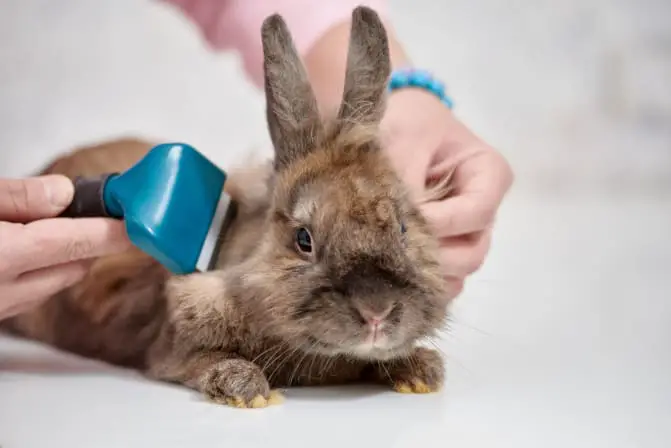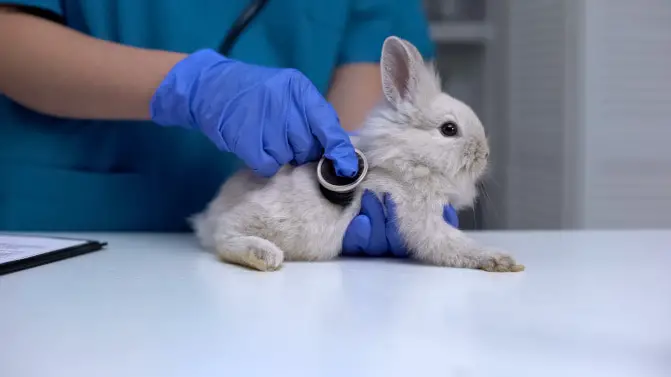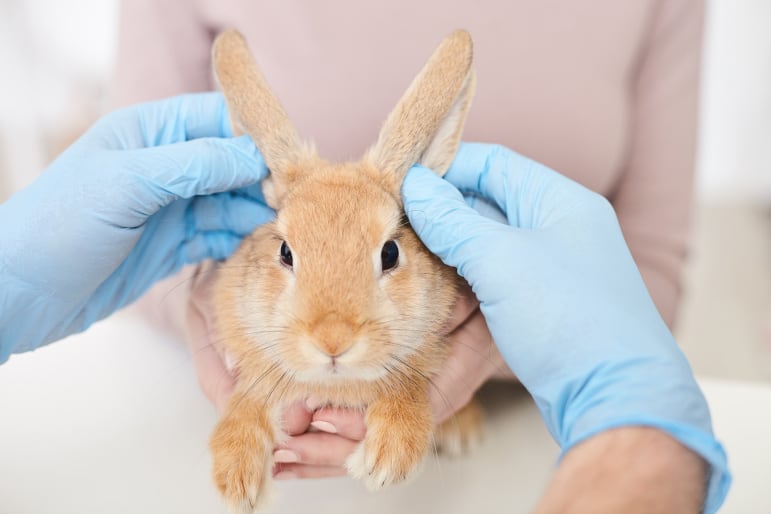Fleas are one of the common problems that pet owners often have to deal with. Rabbits are not excluded. If you have never had to deal with fleas before, they are tiny blood-sucking parasites. They can leap great distances which makes infestation easy and often hard to deal with. To say they are annoying, would be an understatement. Pet rabbit owners usually try to act fast on this issue. Before you know it, all your rabbits in your cage or hutch are affected. Here we will explore in-depth the frequently asked questions that come up with regards to rabbits and dealing with a flea invasion.
How can I tell my bunny has fleas?
There are a few signs that may signal that your pet rabbit may have fleas. You need to be aware so you can get him or her the treatment that is required as soon as possible. Here is a list of signs that should help you spot the problem sooner rather than later.
- Live fleas – So this might be the most obvious. You actually see adult fleas walking and hopping about on your bunny’s fur. You should also be warned that they are most likely not going to stay on your pet rabbit once they have made it into your home. They may even jump on you! Be forewarned fleas bite and they leave red unpleasant spots on your skin.
- Biting his or her skin – Your pet rabbit may bite his skin in an effort to relieve her itchy discomfort. If you have more than one rabbit, all of them may be exhibiting this behaviour. It’s a pretty reliable sign.
- Flea dirt on fur – You may be wondering exactly what flea dirt is. It’s not a term you hear every day. It is a combination of flea faeces and dry blood. Its color is reddish-brown, and it can often be mistaken for regular dirt or soil. If you wipe your rabbit’s with a damp tissue and it looks distinctly reddish, it’s flea dirt.
- Hair loss – You may see patches of fur missing from your bunny’s coat. This often occurs because of the biting of the skin. You may observe tufts of hair in the cage.
- Scaling – You may see dandruff-like flakes on your rabbit’s fur.
How did my rabbit get fleas?
Your pet rabbit can get fleas in a number of ways.
- Veterinary visits – Of course, you will have to take your pet to see your veterinarian periodically. Unfortunately, you will not be the only pet owner there and if the pets who come in have fleas, they can hop onto your rabbit.
- Contact with areas contaminated by flea eggs – Other than an animal’s body, flea eggs can survive in carpets and rugs. They imitate fur and hair and make quite a comfortable home for fleas. Flea eggs can survive on hard surfaces like concrete and hard floors as well. Tiles are also included in this category. The area usually just needs to be dark and a perfect breeding ground is created.
- Cats and Dogs – If you have other pets in your home, namely cats and dogs and they become flea invested, chances are they are going to pass it on your pet rabbits. If your rabbits are kept outdoors, roaming stray cats and dogs could also pass on their fleas.
- Other rabbits – It goes without saying, that if one rabbit in your cage or hutch gets fleas, they are all going to be affected. If you introduce your pet bunny to a new friend on a play date and this rabbit has fleas, you will soon be combating the same problem.
How do I treat my rabbits?

Of course, your main question would be “how do I to get rid of the fleas?”. The safest method is described below.
Things that you will need:
- A comb, bowl, warm soapy water, rubbing alcohol
Process:
- Pour warm water into a bowl and add your soap, you will want to swirl it around to ensure that it is sufficiently sudsy. This same step can be done but using rubbing alcohol instead of the soap water.
- Comb your rabbit’s hair and drown the fleas in the solution.
- Rinse the comb before repeating the process.
You may find this process tedious and may want to explore chemical remedies to solve your flea problem. Firstly, you should always consult your veterinarian if you want to try a topical treatment. The veterinarian would be able to recommend the product that you should use, the correct dosage and application procedure. Most medications that are applied to a rabbit’s fur, are usually rubbed on to the back of the rabbit’s neck. The reason for this is to ensure that your rabbit does not lick the medication off. This can cause affect the effectiveness of the medication and may cause stomach issues. Rabbits’ digestive systems are very sensitive and the chemicals in these treatments can make them sick.
It is also advisable that you separate the rabbits that are being treated since rabbits have a tendency to lick each other. So put the rabbits in different cages before you end up with more issues than just the fleas.
What treatments should I stay away from?
There are treatments that are certainly not recommended and may poison your rabbit, make him or her gravely ill or lead to death.
Never use flea medications that were designed for dogs or cats like Frontline or Sentinel. These medications are quite toxic to bunnies. The chemicals are too harsh for your rabbit’s system. So if you have these at home for your dog or cat, don’t use it on your pet rabbit in an effort to save time or cost.
Any kind of flea powder or dip is just as lethal and should not be used on your rabbit. Rabbits are not fond of baths in any event, so they will not relish being dipped in any solution and may become quite stressed.
Flea collars are not an option either. Your bunny may injure himself trying to get it off. The dosage on these gadgets is also very high and unsuitable for rabbits.
Is there a type of flea that specifically affects rabbits?
Yes, there is. You may have heard of the rabbit flea. Its scientific name is Spilopsyllus cuniculi. It affects mainly rabbits and hares, and may on the rare occasional affect other pets. This flea is particularly dangerous since they are carriers of a particularly lethal disease to rabbits called Myxomatosis. This disease is particularly deadly, it can kill your rabbit in 10 to 12 days. If your rabbit has a fever and swelling on its body which is most likely the point of infection, you should take him or her to the veterinarian immediately. If the disease progresses, your rabbit may develop eyelid and genital swelling, milky discharge from the eyes and lethargy.
Can rabbits develop any flea related health problems?

Yes, they can. Other than Myxomatosis that is spread by rabbit flea, there are other diseases that the more common fleas may cause. While the scratching and itching may cause general discomfort, fleas can affect your rabbit’s health. Here are a few conditions that you need to be aware of:
- Anaemia – The fleas on your pet rabbit are sucking their blood and if there are too many they can experience low haemoglobin levels from the blood loss. Your rabbit’s eyes may also look pale and heart rates may be elevated due to their anaemic condition.
- Infection – Since your rabbit may be constantly biting and scratching his skin, he may develop secondary bacterial infections.
- Alopecia – This condition causes loss of hair or partial baldness in your rabbits. Hair in the affected areas usually takes a while to grow back even with treatment.
How can I prevent my rabbit from getting fleas?
So the key to keeping your rabbits flea-free is controlling their environment. There are a few methods that you can use to keep flea infestations at bay.
- Sprays – You can use flea sprays around your home to kill fleas and flea eggs.
- Flea Bombs – These are insecticide smoke generators that are very effective in killing the fleas that have infested your home. You, your family and your pets usually have to stay out of the fumigated area for about 6-8 hours. After that period, the area is quite safe.
- Powders – Flea powders are used in carpeted areas that fleas find a particularly comfortable haven.
Any one of these should make your home a flea-free zone.
So while fleas are a common problem that if left unchecked can become quite serious for your pet rabbit. It is certainly not insurmountable. There are safe treatments that are very effective. However, you should be careful when choosing treatments. Treatments should always be rabbit-specific. Never use flea medications for other pets like cats and dogs. Your rabbit’s constitution is delicate. Prevention is always better than cure. However, if you do encounter fleas on your pet rabbit try to treat them sooner rather than later.

